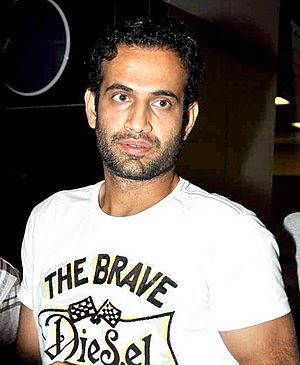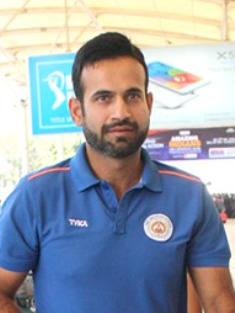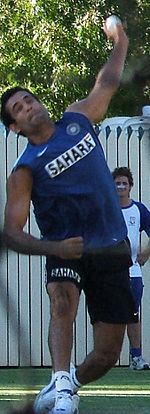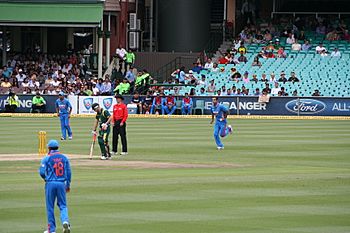Irfan Pathan facts for kids
 |
||||||||||||||||||||||||||||||||||||||||||||||||||||||||||||||||||
| Personal information | ||||||||||||||||||||||||||||||||||||||||||||||||||||||||||||||||||
|---|---|---|---|---|---|---|---|---|---|---|---|---|---|---|---|---|---|---|---|---|---|---|---|---|---|---|---|---|---|---|---|---|---|---|---|---|---|---|---|---|---|---|---|---|---|---|---|---|---|---|---|---|---|---|---|---|---|---|---|---|---|---|---|---|---|---|
| Full name |
Irfan Khan Pathan
|
|||||||||||||||||||||||||||||||||||||||||||||||||||||||||||||||||
| Born | 27 October 1984 Baroda, Gujarat, India |
|||||||||||||||||||||||||||||||||||||||||||||||||||||||||||||||||
| Batting | Left-handed | |||||||||||||||||||||||||||||||||||||||||||||||||||||||||||||||||
| Bowling | Left-arm medium-fast | |||||||||||||||||||||||||||||||||||||||||||||||||||||||||||||||||
| Role | All rounder | |||||||||||||||||||||||||||||||||||||||||||||||||||||||||||||||||
| Relations | Yusuf Pathan (brother) | |||||||||||||||||||||||||||||||||||||||||||||||||||||||||||||||||
| International information | ||||||||||||||||||||||||||||||||||||||||||||||||||||||||||||||||||
| National side |
|
|||||||||||||||||||||||||||||||||||||||||||||||||||||||||||||||||
| Test debut (cap 248) | 12 December 2003 v Australia | |||||||||||||||||||||||||||||||||||||||||||||||||||||||||||||||||
| Last Test | 5 April 2008 v South Africa | |||||||||||||||||||||||||||||||||||||||||||||||||||||||||||||||||
| ODI debut (cap 153) | 9 January 2004 v Australia | |||||||||||||||||||||||||||||||||||||||||||||||||||||||||||||||||
| Last ODI | 4 August 2012 v Sri Lanka | |||||||||||||||||||||||||||||||||||||||||||||||||||||||||||||||||
| ODI shirt no. | 56 | |||||||||||||||||||||||||||||||||||||||||||||||||||||||||||||||||
| T20I debut (cap 7) | 1 December 2006 v South Africa | |||||||||||||||||||||||||||||||||||||||||||||||||||||||||||||||||
| Last T20I | 2 October 2012 v South Africa | |||||||||||||||||||||||||||||||||||||||||||||||||||||||||||||||||
| T20I shirt no. | 56 | |||||||||||||||||||||||||||||||||||||||||||||||||||||||||||||||||
| Domestic team information | ||||||||||||||||||||||||||||||||||||||||||||||||||||||||||||||||||
| Years | Team | |||||||||||||||||||||||||||||||||||||||||||||||||||||||||||||||||
| 2000–2017 | Baroda | |||||||||||||||||||||||||||||||||||||||||||||||||||||||||||||||||
| 2005 | Middlesex | |||||||||||||||||||||||||||||||||||||||||||||||||||||||||||||||||
| 2008–2010 | Kings XI Punjab | |||||||||||||||||||||||||||||||||||||||||||||||||||||||||||||||||
| 2011–2013 | Delhi Daredevils (squad no. 56) | |||||||||||||||||||||||||||||||||||||||||||||||||||||||||||||||||
| 2014 | Sunrisers Hyderabad (squad no. 56) | |||||||||||||||||||||||||||||||||||||||||||||||||||||||||||||||||
| 2016 | Rising Pune Supergiants (squad no. 28) | |||||||||||||||||||||||||||||||||||||||||||||||||||||||||||||||||
| 2017 | Gujarat Lions (squad no. 56) | |||||||||||||||||||||||||||||||||||||||||||||||||||||||||||||||||
| 2020 | Kandy Tuskers | |||||||||||||||||||||||||||||||||||||||||||||||||||||||||||||||||
| Career statistics | ||||||||||||||||||||||||||||||||||||||||||||||||||||||||||||||||||
|
||||||||||||||||||||||||||||||||||||||||||||||||||||||||||||||||||
|
Medal record
|
||||||||||||||||||||||||||||||||||||||||||||||||||||||||||||||||||
|
Source: ESPNcricinfo, 6 January 2019
|
||||||||||||||||||||||||||||||||||||||||||||||||||||||||||||||||||
Irfan Pathan (born 27 October 1984) is a former Indian cricketer who is now a cricket commentator and analyst. He was a bowling all-rounder, which means he was skilled at both bowling and batting. Pathan was a key member of the Indian team that won the first-ever 2007 ICC T20 World Cup and the 2013 ICC Champions Trophy.
When he started his career, Pathan was a fast-medium swing bowler. He joined the Indian national team when he was just 19. His amazing ability to swing the cricket ball earned him comparisons to the great Pakistani bowler Wasim Akram.
One of his most famous moments came in early 2006. He became the only bowler in history to take a hat-trick (three wickets in three consecutive balls) in the very first over of a Test match. This incredible feat happened against Pakistan.
After 2006, he struggled with his bowling speed and swing, which made it harder for him to take wickets. Even though his batting improved, he was dropped from the team for a while. He made a strong comeback in the 2007 World Twenty20, helping India win the final. He retired from all forms of cricket in January 2020.
Contents
Personal Life and Background
Irfan Pathan was born in Baroda, Gujarat, India. He and his older brother, Yusuf Pathan, who also became a famous cricketer, grew up in a mosque in Vadodara. Their family did not have much money, and their father was a muezzin (a person who calls people to prayer).
Their parents hoped they would become Islamic scholars, but both brothers loved cricket. At first, Irfan's bowling wasn't very strong. But he trained for six hours every day in the hot sun. This hard work and discipline helped him become a great player.
In 2016, Pathan married Safa Baig, a model from Jeddah. They have two sons.
Early Cricket Journey
With help from former Indian captain Datta Gaekwad, Pathan was selected for the Under-14 Baroda cricket team. When he was chosen for the Under-15 national tournament, he finally got his own full set of cricket gear. Before that, he had to use second-hand equipment because his family couldn't afford new gear.
Pathan quickly moved up through the youth teams. His excellent performance in an Asian youth tournament in 2003 caught everyone's attention. He was the best bowler in the tournament, taking 18 wickets. In one match against Bangladesh, he took an amazing 9 wickets for just 16 runs. These performances led to his selection for the senior Indian national team.
International Career
A Shining Debut

Pathan made his Test debut against Australia in December 2003 at the age of 19. In the ODI series that followed, he was the top wicket-taker with 16 wickets. He even won his first Man of the Match award for taking 4 wickets for 24 runs against Zimbabwe.
In 2004, he played a huge role in India's historic Test series win in Pakistan. His great performances continued, and the International Cricket Council (ICC) named him the Emerging Player of the Year in 2004.
Becoming a Top All-Rounder
When Greg Chappell became India's coach in 2005, he saw Pathan's potential as a batsman. Pathan worked hard on his batting and became a true all-rounder. He was even asked to open the batting for India and scored 93 runs in one Test match.
For a while, he was one of the best all-rounders in the world. He was ranked No. 2 in the ICC's ODI rankings for all-rounders. People started comparing him to India's legendary all-rounder, Kapil Dev.
The Famous Hat-Trick
On January 29, 2006, in a Test match against Pakistan in Karachi, Pathan made history. In the first over of the match, he took a hat-trick. He dismissed Salman Butt, Younis Khan, and Mohammad Yousuf on three straight deliveries. To this day, he is the only bowler to achieve a Test hat-trick in the first over of a match.
2007 T20 World Cup Hero
After a period of poor form, Pathan made a comeback for the first-ever World Twenty20 in 2007. He played a crucial role throughout the tournament.
In the final against Pakistan, he delivered an outstanding performance. He took 3 wickets for just 16 runs, dismissing key Pakistani batsmen. His brilliant bowling helped India win the thrilling final, and he was named the Man of the Match.
Later Career and Retirement
Pathan's performance in the T20 World Cup earned him a spot back in the Test and ODI teams. He even scored his first and only Test century (102 runs) against Pakistan in 2007. However, he struggled to keep his place in the team due to injuries and inconsistent form.
He continued to play domestic cricket, including for the Indian Premier League (IPL) teams like Kings XI Punjab and Delhi Daredevils. He also served as a coach and mentor for the Jammu and Kashmir cricket team. In January 2020, Pathan announced his retirement from all forms of cricket.
Life After Cricket
Television and Film
In 2015, Pathan participated in the popular dance reality show Jhalak Dikhhla Jaa. He also made his acting debut in the 2022 Tamil movie Cobra, where he played a lead role.
Cricket Academy
Irfan and his brother Yusuf started the Cricket Academy of Pathans. The academy aims to train young, aspiring cricketers across India. They have teamed up with famous cricketers like Kapil Dev to mentor the young players.
Filmography
| Year | Film | Role(s) | Language | Notes |
|---|---|---|---|---|
| 2003 | Jab Chaye Mera Jaadoo | Himself | Hindi | Short film |
| 2004 | Mujhse Shaadi Karogi | Special appearance | ||
| 2005 | Oye Bubbly | Short film | ||
| 2008–present | Taarak Mehta Ka Ooltah Chashmah | Special appearance | ||
| 2022 | Cobra | Aslan Yilmaz | Tamil | Debut lead role film |
 | Anna J. Cooper |
 | Mary McLeod Bethune |
 | Lillie Mae Bradford |



